Understanding Language and Literacy
VerifiedAdded on 2023/04/12
|6
|1302
|151
AI Summary
This essay discusses the development of children's oral language and the theoretical perspectives that support it. It explores the four components of oral language development and emphasizes the importance of oral language in acquiring reading and writing skills.
Contribute Materials
Your contribution can guide someone’s learning journey. Share your
documents today.
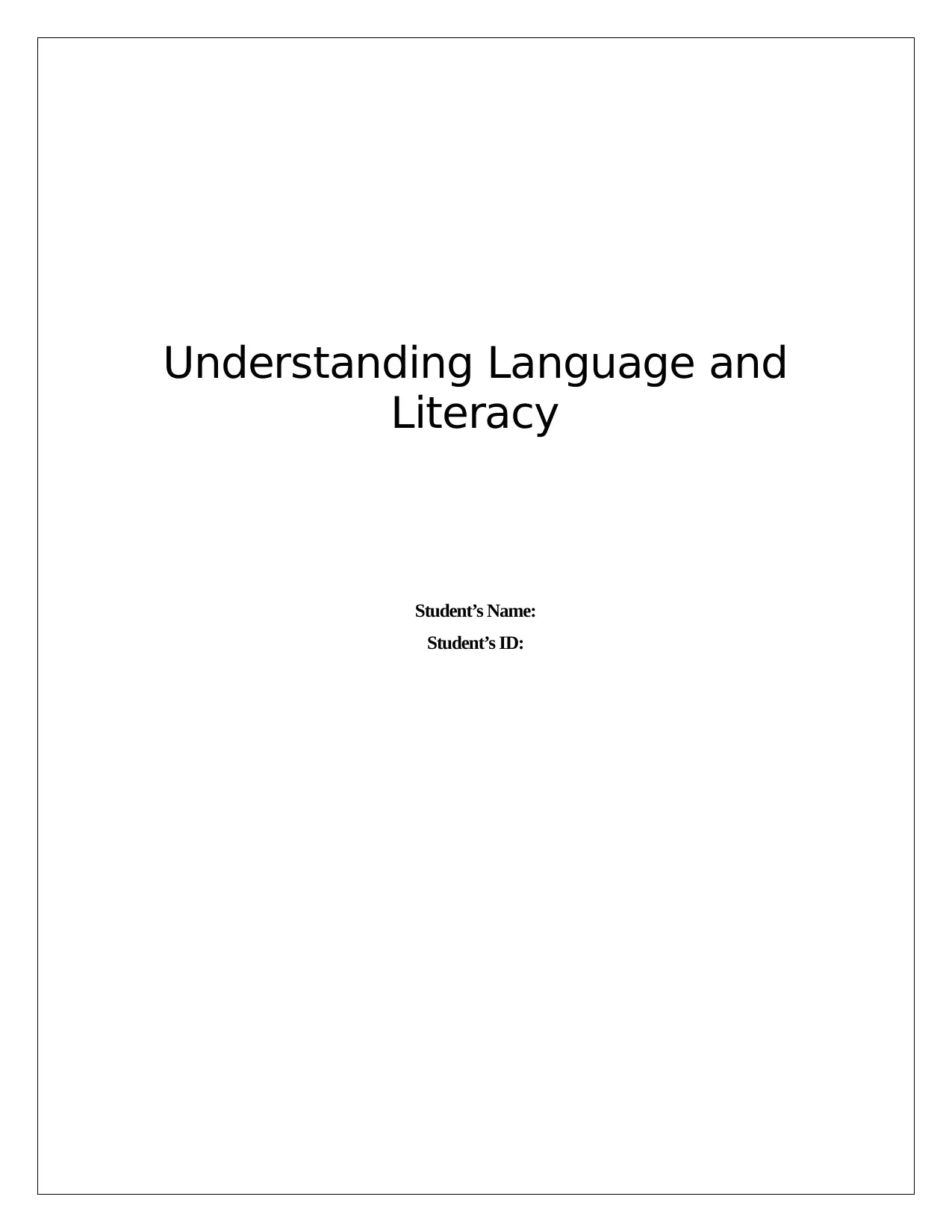
Understanding Language and
Literacy
Student’s Name:
Student’s ID:
Literacy
Student’s Name:
Student’s ID:
Secure Best Marks with AI Grader
Need help grading? Try our AI Grader for instant feedback on your assignments.
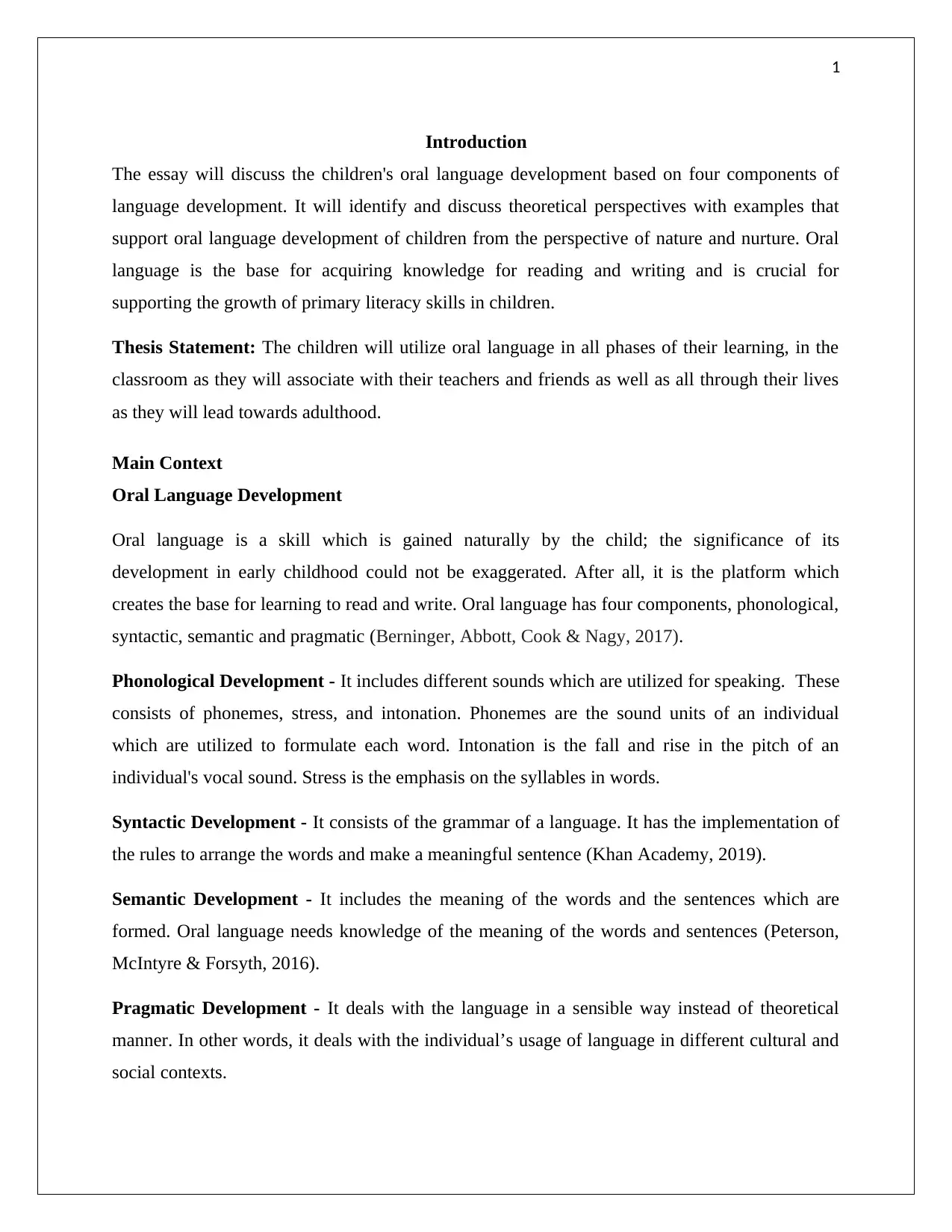
1
Introduction
The essay will discuss the children's oral language development based on four components of
language development. It will identify and discuss theoretical perspectives with examples that
support oral language development of children from the perspective of nature and nurture. Oral
language is the base for acquiring knowledge for reading and writing and is crucial for
supporting the growth of primary literacy skills in children.
Thesis Statement: The children will utilize oral language in all phases of their learning, in the
classroom as they will associate with their teachers and friends as well as all through their lives
as they will lead towards adulthood.
Main Context
Oral Language Development
Oral language is a skill which is gained naturally by the child; the significance of its
development in early childhood could not be exaggerated. After all, it is the platform which
creates the base for learning to read and write. Oral language has four components, phonological,
syntactic, semantic and pragmatic (Berninger, Abbott, Cook & Nagy, 2017).
Phonological Development - It includes different sounds which are utilized for speaking. These
consists of phonemes, stress, and intonation. Phonemes are the sound units of an individual
which are utilized to formulate each word. Intonation is the fall and rise in the pitch of an
individual's vocal sound. Stress is the emphasis on the syllables in words.
Syntactic Development - It consists of the grammar of a language. It has the implementation of
the rules to arrange the words and make a meaningful sentence (Khan Academy, 2019).
Semantic Development - It includes the meaning of the words and the sentences which are
formed. Oral language needs knowledge of the meaning of the words and sentences (Peterson,
McIntyre & Forsyth, 2016).
Pragmatic Development - It deals with the language in a sensible way instead of theoretical
manner. In other words, it deals with the individual’s usage of language in different cultural and
social contexts.
Introduction
The essay will discuss the children's oral language development based on four components of
language development. It will identify and discuss theoretical perspectives with examples that
support oral language development of children from the perspective of nature and nurture. Oral
language is the base for acquiring knowledge for reading and writing and is crucial for
supporting the growth of primary literacy skills in children.
Thesis Statement: The children will utilize oral language in all phases of their learning, in the
classroom as they will associate with their teachers and friends as well as all through their lives
as they will lead towards adulthood.
Main Context
Oral Language Development
Oral language is a skill which is gained naturally by the child; the significance of its
development in early childhood could not be exaggerated. After all, it is the platform which
creates the base for learning to read and write. Oral language has four components, phonological,
syntactic, semantic and pragmatic (Berninger, Abbott, Cook & Nagy, 2017).
Phonological Development - It includes different sounds which are utilized for speaking. These
consists of phonemes, stress, and intonation. Phonemes are the sound units of an individual
which are utilized to formulate each word. Intonation is the fall and rise in the pitch of an
individual's vocal sound. Stress is the emphasis on the syllables in words.
Syntactic Development - It consists of the grammar of a language. It has the implementation of
the rules to arrange the words and make a meaningful sentence (Khan Academy, 2019).
Semantic Development - It includes the meaning of the words and the sentences which are
formed. Oral language needs knowledge of the meaning of the words and sentences (Peterson,
McIntyre & Forsyth, 2016).
Pragmatic Development - It deals with the language in a sensible way instead of theoretical
manner. In other words, it deals with the individual’s usage of language in different cultural and
social contexts.
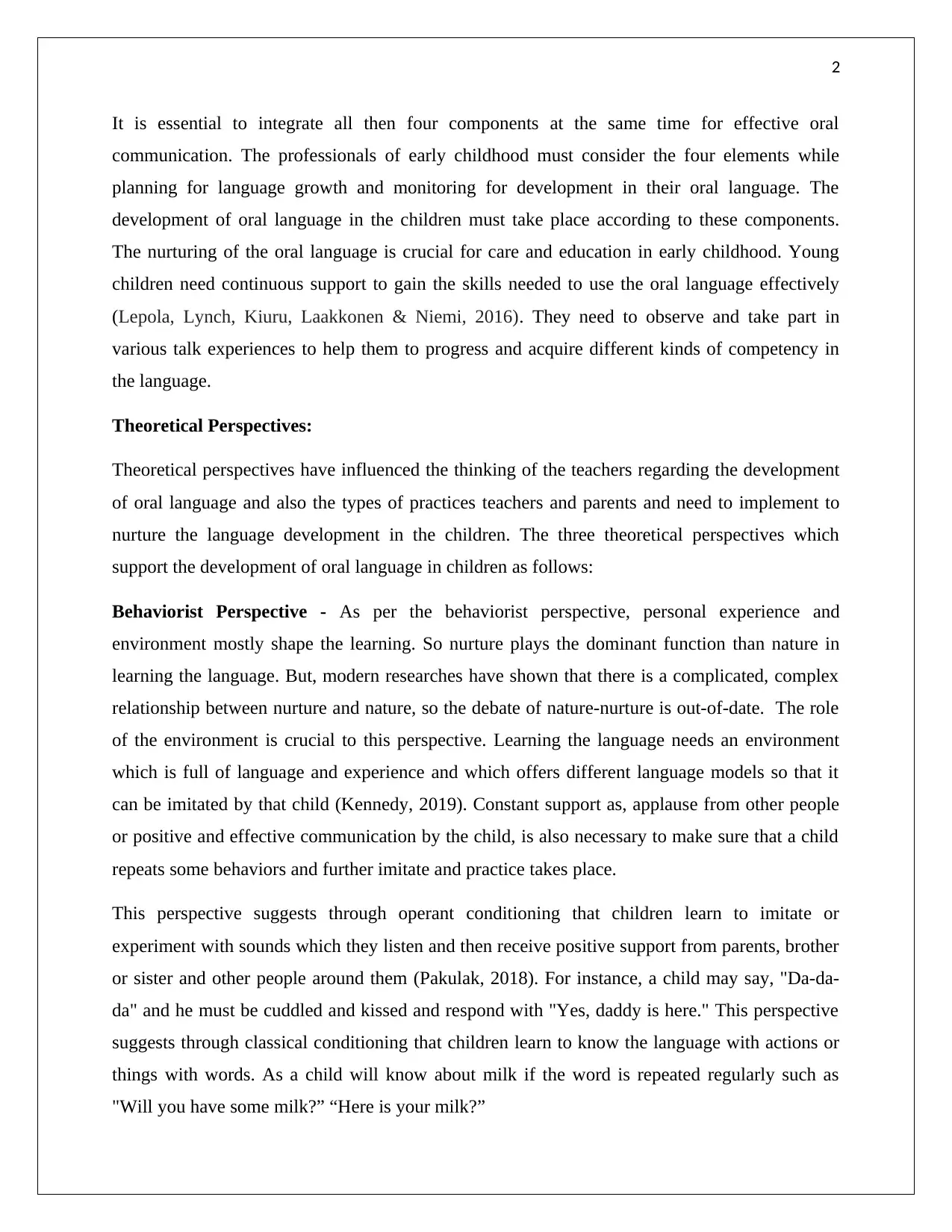
2
It is essential to integrate all then four components at the same time for effective oral
communication. The professionals of early childhood must consider the four elements while
planning for language growth and monitoring for development in their oral language. The
development of oral language in the children must take place according to these components.
The nurturing of the oral language is crucial for care and education in early childhood. Young
children need continuous support to gain the skills needed to use the oral language effectively
(Lepola, Lynch, Kiuru, Laakkonen & Niemi, 2016). They need to observe and take part in
various talk experiences to help them to progress and acquire different kinds of competency in
the language.
Theoretical Perspectives:
Theoretical perspectives have influenced the thinking of the teachers regarding the development
of oral language and also the types of practices teachers and parents and need to implement to
nurture the language development in the children. The three theoretical perspectives which
support the development of oral language in children as follows:
Behaviorist Perspective - As per the behaviorist perspective, personal experience and
environment mostly shape the learning. So nurture plays the dominant function than nature in
learning the language. But, modern researches have shown that there is a complicated, complex
relationship between nurture and nature, so the debate of nature-nurture is out-of-date. The role
of the environment is crucial to this perspective. Learning the language needs an environment
which is full of language and experience and which offers different language models so that it
can be imitated by that child (Kennedy, 2019). Constant support as, applause from other people
or positive and effective communication by the child, is also necessary to make sure that a child
repeats some behaviors and further imitate and practice takes place.
This perspective suggests through operant conditioning that children learn to imitate or
experiment with sounds which they listen and then receive positive support from parents, brother
or sister and other people around them (Pakulak, 2018). For instance, a child may say, "Da-da-
da" and he must be cuddled and kissed and respond with "Yes, daddy is here." This perspective
suggests through classical conditioning that children learn to know the language with actions or
things with words. As a child will know about milk if the word is repeated regularly such as
"Will you have some milk?” “Here is your milk?”
It is essential to integrate all then four components at the same time for effective oral
communication. The professionals of early childhood must consider the four elements while
planning for language growth and monitoring for development in their oral language. The
development of oral language in the children must take place according to these components.
The nurturing of the oral language is crucial for care and education in early childhood. Young
children need continuous support to gain the skills needed to use the oral language effectively
(Lepola, Lynch, Kiuru, Laakkonen & Niemi, 2016). They need to observe and take part in
various talk experiences to help them to progress and acquire different kinds of competency in
the language.
Theoretical Perspectives:
Theoretical perspectives have influenced the thinking of the teachers regarding the development
of oral language and also the types of practices teachers and parents and need to implement to
nurture the language development in the children. The three theoretical perspectives which
support the development of oral language in children as follows:
Behaviorist Perspective - As per the behaviorist perspective, personal experience and
environment mostly shape the learning. So nurture plays the dominant function than nature in
learning the language. But, modern researches have shown that there is a complicated, complex
relationship between nurture and nature, so the debate of nature-nurture is out-of-date. The role
of the environment is crucial to this perspective. Learning the language needs an environment
which is full of language and experience and which offers different language models so that it
can be imitated by that child (Kennedy, 2019). Constant support as, applause from other people
or positive and effective communication by the child, is also necessary to make sure that a child
repeats some behaviors and further imitate and practice takes place.
This perspective suggests through operant conditioning that children learn to imitate or
experiment with sounds which they listen and then receive positive support from parents, brother
or sister and other people around them (Pakulak, 2018). For instance, a child may say, "Da-da-
da" and he must be cuddled and kissed and respond with "Yes, daddy is here." This perspective
suggests through classical conditioning that children learn to know the language with actions or
things with words. As a child will know about milk if the word is repeated regularly such as
"Will you have some milk?” “Here is your milk?”
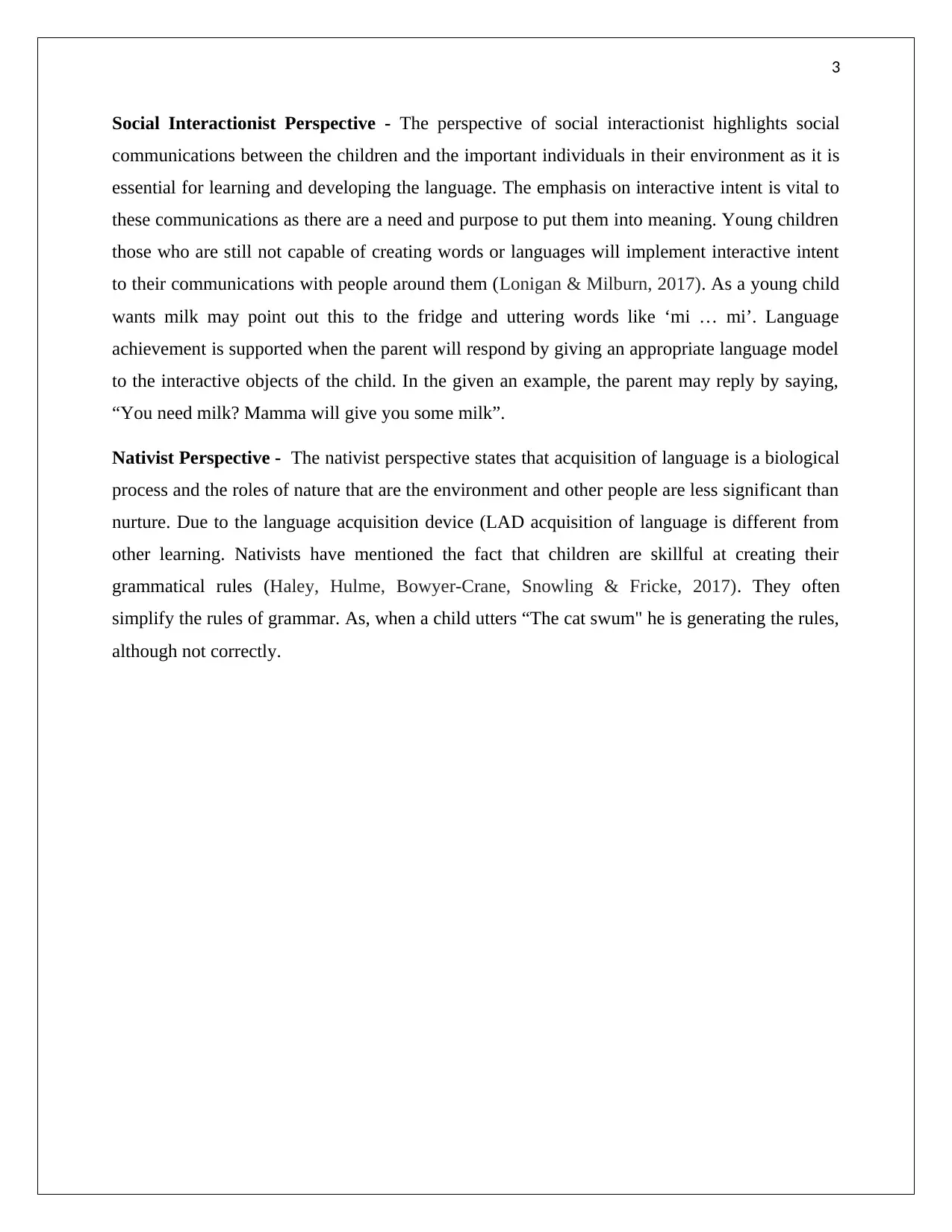
3
Social Interactionist Perspective - The perspective of social interactionist highlights social
communications between the children and the important individuals in their environment as it is
essential for learning and developing the language. The emphasis on interactive intent is vital to
these communications as there are a need and purpose to put them into meaning. Young children
those who are still not capable of creating words or languages will implement interactive intent
to their communications with people around them (Lonigan & Milburn, 2017). As a young child
wants milk may point out this to the fridge and uttering words like ‘mi … mi’. Language
achievement is supported when the parent will respond by giving an appropriate language model
to the interactive objects of the child. In the given an example, the parent may reply by saying,
“You need milk? Mamma will give you some milk”.
Nativist Perspective - The nativist perspective states that acquisition of language is a biological
process and the roles of nature that are the environment and other people are less significant than
nurture. Due to the language acquisition device (LAD acquisition of language is different from
other learning. Nativists have mentioned the fact that children are skillful at creating their
grammatical rules (Haley, Hulme, Bowyer‐Crane, Snowling & Fricke, 2017). They often
simplify the rules of grammar. As, when a child utters “The cat swum" he is generating the rules,
although not correctly.
Social Interactionist Perspective - The perspective of social interactionist highlights social
communications between the children and the important individuals in their environment as it is
essential for learning and developing the language. The emphasis on interactive intent is vital to
these communications as there are a need and purpose to put them into meaning. Young children
those who are still not capable of creating words or languages will implement interactive intent
to their communications with people around them (Lonigan & Milburn, 2017). As a young child
wants milk may point out this to the fridge and uttering words like ‘mi … mi’. Language
achievement is supported when the parent will respond by giving an appropriate language model
to the interactive objects of the child. In the given an example, the parent may reply by saying,
“You need milk? Mamma will give you some milk”.
Nativist Perspective - The nativist perspective states that acquisition of language is a biological
process and the roles of nature that are the environment and other people are less significant than
nurture. Due to the language acquisition device (LAD acquisition of language is different from
other learning. Nativists have mentioned the fact that children are skillful at creating their
grammatical rules (Haley, Hulme, Bowyer‐Crane, Snowling & Fricke, 2017). They often
simplify the rules of grammar. As, when a child utters “The cat swum" he is generating the rules,
although not correctly.
Secure Best Marks with AI Grader
Need help grading? Try our AI Grader for instant feedback on your assignments.
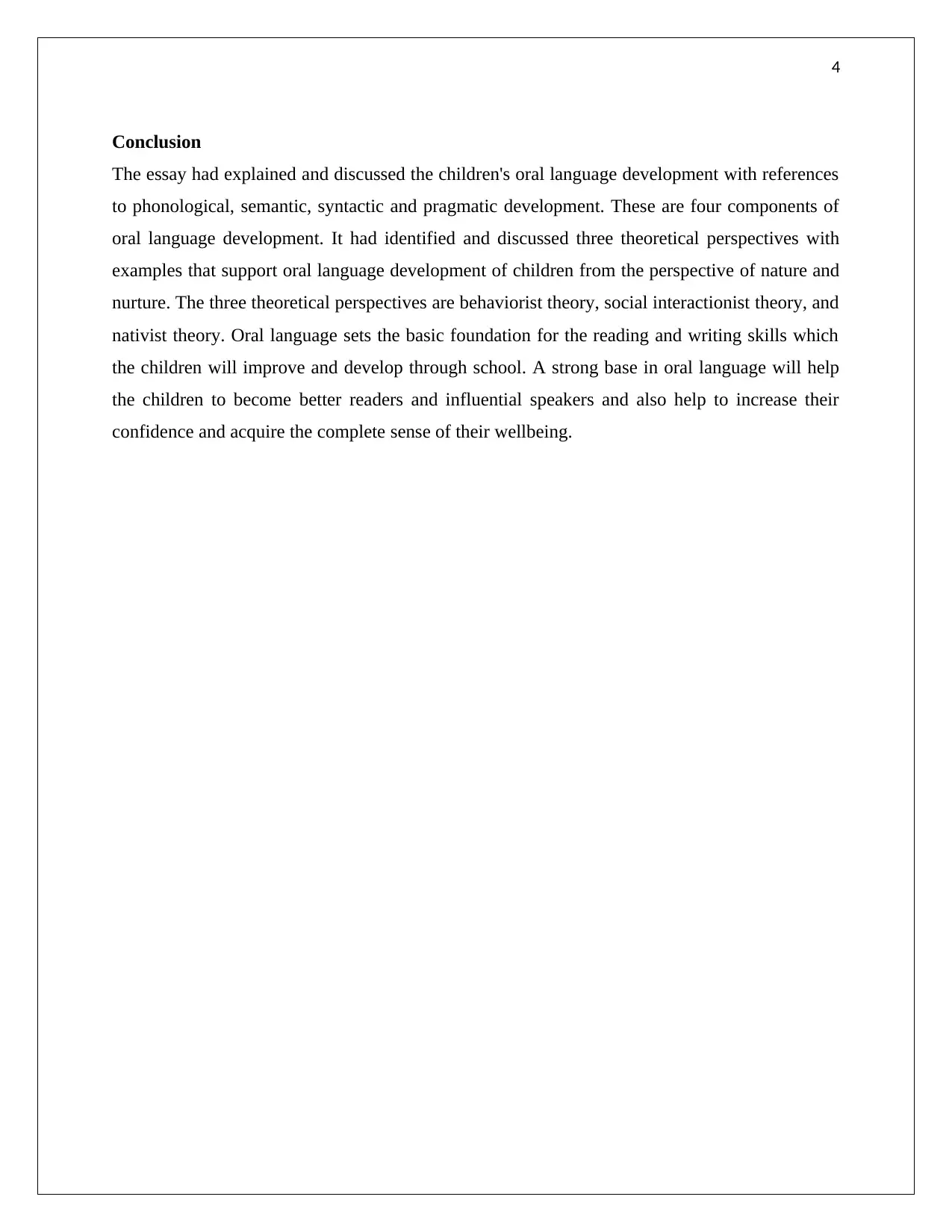
4
Conclusion
The essay had explained and discussed the children's oral language development with references
to phonological, semantic, syntactic and pragmatic development. These are four components of
oral language development. It had identified and discussed three theoretical perspectives with
examples that support oral language development of children from the perspective of nature and
nurture. The three theoretical perspectives are behaviorist theory, social interactionist theory, and
nativist theory. Oral language sets the basic foundation for the reading and writing skills which
the children will improve and develop through school. A strong base in oral language will help
the children to become better readers and influential speakers and also help to increase their
confidence and acquire the complete sense of their wellbeing.
Conclusion
The essay had explained and discussed the children's oral language development with references
to phonological, semantic, syntactic and pragmatic development. These are four components of
oral language development. It had identified and discussed three theoretical perspectives with
examples that support oral language development of children from the perspective of nature and
nurture. The three theoretical perspectives are behaviorist theory, social interactionist theory, and
nativist theory. Oral language sets the basic foundation for the reading and writing skills which
the children will improve and develop through school. A strong base in oral language will help
the children to become better readers and influential speakers and also help to increase their
confidence and acquire the complete sense of their wellbeing.
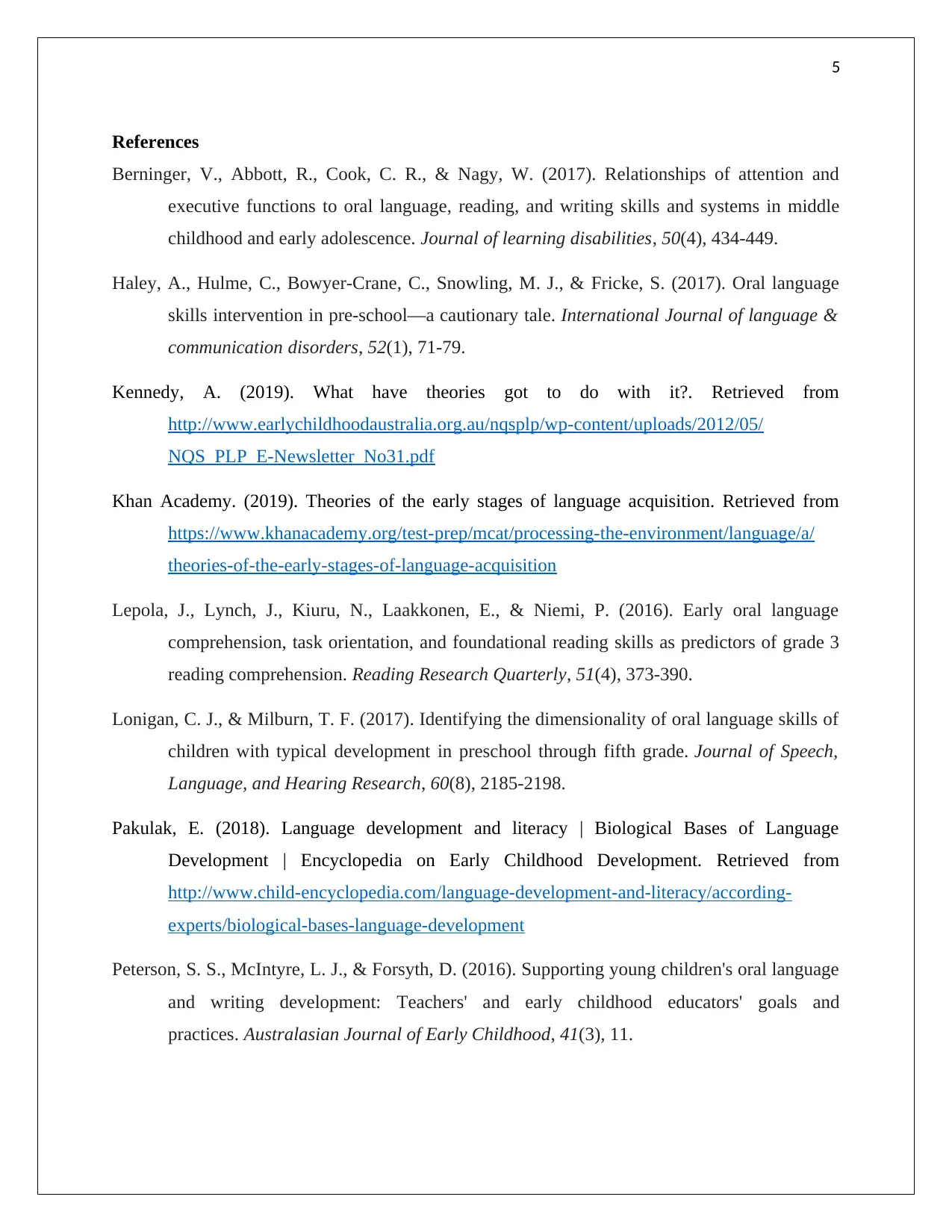
5
References
Berninger, V., Abbott, R., Cook, C. R., & Nagy, W. (2017). Relationships of attention and
executive functions to oral language, reading, and writing skills and systems in middle
childhood and early adolescence. Journal of learning disabilities, 50(4), 434-449.
Haley, A., Hulme, C., Bowyer‐Crane, C., Snowling, M. J., & Fricke, S. (2017). Oral language
skills intervention in pre‐school—a cautionary tale. International Journal of language &
communication disorders, 52(1), 71-79.
Kennedy, A. (2019). What have theories got to do with it?. Retrieved from
http://www.earlychildhoodaustralia.org.au/nqsplp/wp-content/uploads/2012/05/
NQS_PLP_E-Newsletter_No31.pdf
Khan Academy. (2019). Theories of the early stages of language acquisition. Retrieved from
https://www.khanacademy.org/test-prep/mcat/processing-the-environment/language/a/
theories-of-the-early-stages-of-language-acquisition
Lepola, J., Lynch, J., Kiuru, N., Laakkonen, E., & Niemi, P. (2016). Early oral language
comprehension, task orientation, and foundational reading skills as predictors of grade 3
reading comprehension. Reading Research Quarterly, 51(4), 373-390.
Lonigan, C. J., & Milburn, T. F. (2017). Identifying the dimensionality of oral language skills of
children with typical development in preschool through fifth grade. Journal of Speech,
Language, and Hearing Research, 60(8), 2185-2198.
Pakulak, E. (2018). Language development and literacy | Biological Bases of Language
Development | Encyclopedia on Early Childhood Development. Retrieved from
http://www.child-encyclopedia.com/language-development-and-literacy/according-
experts/biological-bases-language-development
Peterson, S. S., McIntyre, L. J., & Forsyth, D. (2016). Supporting young children's oral language
and writing development: Teachers' and early childhood educators' goals and
practices. Australasian Journal of Early Childhood, 41(3), 11.
References
Berninger, V., Abbott, R., Cook, C. R., & Nagy, W. (2017). Relationships of attention and
executive functions to oral language, reading, and writing skills and systems in middle
childhood and early adolescence. Journal of learning disabilities, 50(4), 434-449.
Haley, A., Hulme, C., Bowyer‐Crane, C., Snowling, M. J., & Fricke, S. (2017). Oral language
skills intervention in pre‐school—a cautionary tale. International Journal of language &
communication disorders, 52(1), 71-79.
Kennedy, A. (2019). What have theories got to do with it?. Retrieved from
http://www.earlychildhoodaustralia.org.au/nqsplp/wp-content/uploads/2012/05/
NQS_PLP_E-Newsletter_No31.pdf
Khan Academy. (2019). Theories of the early stages of language acquisition. Retrieved from
https://www.khanacademy.org/test-prep/mcat/processing-the-environment/language/a/
theories-of-the-early-stages-of-language-acquisition
Lepola, J., Lynch, J., Kiuru, N., Laakkonen, E., & Niemi, P. (2016). Early oral language
comprehension, task orientation, and foundational reading skills as predictors of grade 3
reading comprehension. Reading Research Quarterly, 51(4), 373-390.
Lonigan, C. J., & Milburn, T. F. (2017). Identifying the dimensionality of oral language skills of
children with typical development in preschool through fifth grade. Journal of Speech,
Language, and Hearing Research, 60(8), 2185-2198.
Pakulak, E. (2018). Language development and literacy | Biological Bases of Language
Development | Encyclopedia on Early Childhood Development. Retrieved from
http://www.child-encyclopedia.com/language-development-and-literacy/according-
experts/biological-bases-language-development
Peterson, S. S., McIntyre, L. J., & Forsyth, D. (2016). Supporting young children's oral language
and writing development: Teachers' and early childhood educators' goals and
practices. Australasian Journal of Early Childhood, 41(3), 11.
1 out of 6
Related Documents
Your All-in-One AI-Powered Toolkit for Academic Success.
+13062052269
info@desklib.com
Available 24*7 on WhatsApp / Email
![[object Object]](/_next/static/media/star-bottom.7253800d.svg)
Unlock your academic potential
© 2024 | Zucol Services PVT LTD | All rights reserved.





